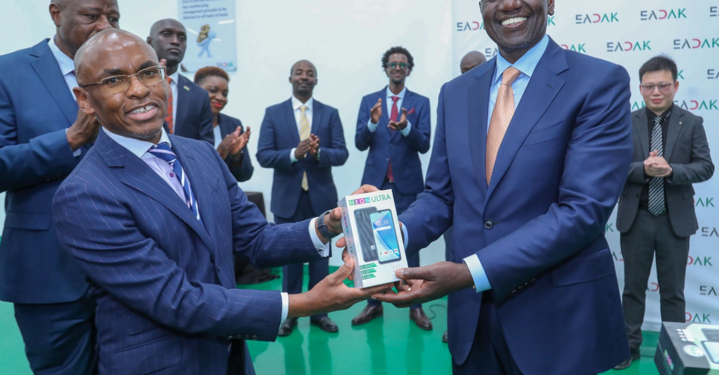Nearly half of mobile phones imported into the Kenyan market are not taxed, President William Ruto on Monday noted that this presented a challenge to the government in revenue collection.
“This importation of smartphones has given us a lot of problems, KRA is having difficulties because many phones are imported through all manner of places. Our statistics is that close to 50 per cent of phones imported into Kenya don’t pass through the normal tax process,” said Ruto.
“One way of dealing with the problem is to manufacture all phones locally, a local plant will also help create jobs to the bulging youth population” he said.
The President made the remarks during launch of Kenya’s first smart devices assembling plant in Athi River, Machakos County.
The East Africa Device Assembly factory was set-up as a joint venture of local Mobile Network Operators and International device manufacturers. The devices which will be available countrywide at Faiba shops and dealer stores as well as Safaricom shops and Masoko online platform will retail from KES. 7, 499.
The anchor mobile phone devices at launch will be the 4G-enabled Neon 5” “Smarta” and 6 ½” “Ultra”, with further devices diversifying the product range to be launched in the next few months, including a locally assembled tablet.
The factory which is in fulfillment of government’s promise to establish local smartphone assembly capacity in Kenya has been built with a capacity to produce up to 3 million mobile phone units annually.
“This assembly plant will support government’s agenda to enhance digital inclusion in the country. We have been able to achieve affordability through a collaborative approach that comprises industry partnership and favourable government policies,” said Joshua Chepkwony, Chairman of EADAK and Chairman & CEO of Jamii Telecom.
Additionally, it is projected that the factory will generate between 300 and 500 direct jobs, foster local talent development and contribute to the country’s economic growth.
“The launch of EADAK reaffirms our belief in the power of connectivity to transform lives and drive economic progress. This partnership underscores our relentless pursuit to expand 4G access and empower Kenyans through affordable, high-quality smartphones, create employment opportunities and grow our economy,” said Peter Ndegwa, CEO, Safaricom.
Competition Intensifies in Kenya’s Smartphone Market – Kenyan Wallstreet




